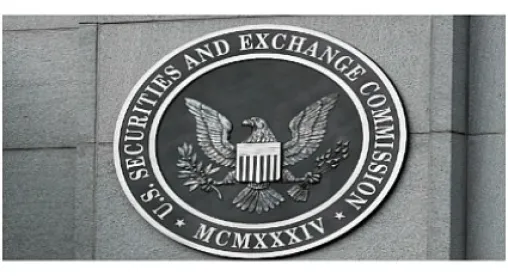The U.S. Court of Appeals for the Seventh Circuit held yesterday that federal District Courts do not have subject-matter jurisdiction to entertain challenges to ongoing SEC administrative enforcement proceedings where the challenger is already a party to those proceedings. A party to a pending administrative proceeding must defend against that proceeding and then seek review from the SEC Commissioners and, eventually, the federal appellate courts.
The Seventh Circuit's decision in Bebo v. SEC is the latest ruling in a multi-front series of challenges to the SEC's authority to bring administrative enforcement proceedings – rather than federal-court actions – especially against nonregulated persons and entities. The Seventh Circuit's ruling disagrees with several recent decisions holding that the statutory scheme for review of SEC administrative proceedings does not preclude court challenges to the constitutionality of the SEC's enabling legislation or to the structural authority of the SEC.
Factual Background
The SEC brought an administrative cease-and-desist proceeding against Bebo, the former CEO of a public company, for violations of the federal securities laws. Bebo answered and asserted two constitutional arguments as affirmative defenses: (i) the Dodd-Frank Act's authorization of administrative enforcement proceedings violates the Fifth Amendment's equal-protection and due-process clauses because it gives the SEC "unguided" authority to choose which respondents will and will not receive the procedural protections of federal-court proceedings, and (ii) the SEC's administrative proceedings are unconstitutional under Article II of the Constitution because the administrative law judges ("ALJs") who conduct such proceedings are shielded from removal by multiple layers of for-cause protection.
Instead of waiting for the administrative process to end, Bebo sued in federal court, alleging that the SEC lacked constitutional authority to continue the administrative proceedings. The District Court dismissed the case, holding that it lacked subject-matter jurisdiction to entertain the challenge in light of the statutory procedures for review of ALJ rulings.
Under applicable law, a respondent in an SEC administrative proceeding may file a petition for review with the Commission, which can either adopt the ALJ's initial decision as the final decision of the agency or grant the petition and conduct de novo review. If the Commission's final decision is adverse, the respondent may seek judicial review under 15 U.S.C. § 78Y(a)(1) either in the U.S. Court of Appeals for the District of Columbia Circuit or in the Circuit Court where the respondent resides or has his or her principal place of business.
Bebo appealed the dismissal, and the Seventh Circuit affirmed.
Seventh Circuit's Decision
The Seventh Circuit agreed with the District Court that the statute provides the exclusive route for judicial review of challenges to a pending administrative proceeding even where a party to such a proceeding contests the SEC's authority to proceed administratively in the first place. Applying the framework that the Supreme Court established in recent decisions challenging other administrative schemes, the Seventh Circuit held that the statutory review provisions did "not foreclose all meaningful judicial review."
The Seventh Circuit distinguished Bebo's situation from that of the challengers in Free Enterprise Fund v. Public Company Accounting Oversight Board, in which the Supreme Court held that subject-matter jurisdiction existed to adjudicate a facial challenge to the statute creating the Public Company Accounting Oversight Board (the "PCAOB"). The Supreme Court there ruled that § 78y did not provide an exclusive system for judicial review where (i) "a finding of preclusion could foreclose all meaningful judicial review," (ii) the challenge was "wholly collateral to a statute's review provisions," and (iii) the plaintiffs' claims were "outside the agency's expertise."
The Seventh Circuit held that requiring Bebo to continue the administrative proceeding and then seek review under the statutory scheme would not deprive her of all meaningful judicial review. The court viewed Free Enterprise Fund as inapposite because, although the plaintiffs in that action had been under investigation by the PCAOB, the PCAOB had not yet brought an administrative proceeding when the plaintiffs challenged the constitutionality of the governing statute. Bebo, in contrast, filed suit after the administrative proceeding had begun. Thus, unlike the plaintiffs in Free Enterprise Fund, she did "not need to 'select and challenge a Board rule at random'" in order to raise her constitutional arguments; nor did she "have to 'bet the farm . . . by taking the violative action' before 'testing the validity of the law.'" "She is already the respondent in a pending enforcement proceeding, so she does not need to risk incurring a sanction voluntarily just to bring her constitutional challenges before a court of competent jurisdiction. After the pending enforcement action has run its course, she can raise her objections in a circuit court of appeals established under Article III."
The Seventh Circuit punted on whether Bebo's constitutional claims were "wholly collateral" to the statute's review provisions – Free Enterprise Fund's second factor. The Seventh Circuit noted that some courts have construed that factor to "focus on the relationship between the merits of the constitutional claim and the factual allegations against the plaintiff in the administrative proceeding," while others have read the factor to "focus on whether the constitutional claims are being raised as a 'vehicle' to challenge agency action taken during an administrative proceeding." The Seventh Circuit did not resolve the question, because it concluded that the first factor – availability of meaningful judicial review – was "the most critical thread in the case law."
As for the third factor – whether the plaintiff's claims were "outside the agency's expertise" – the Seventh Circuit observed that the Supreme Court's post-Free Enterprise Fund decision in Elgin v. Department of Treasury had held that, even if an agency might not have expertise over a particular constitutional claim, such a narrow formulation of the question "'overlook[s] the many threshold questions that may accompany a constitutional claim and to which the [agency] can apply its expertise.'"
The Seventh Circuit distilled the Supreme Court's case law into several key points:
-
A plaintiff cannot sue in District Court "merely because her claims are facial constitutional challenges" to an agency's authority to act;
-
The District Court's subject-matter jurisdiction "does not turn on whether the SEC has the authority to hold [the challenged statute] unconstitutional, nor does it hinge on whether [the plaintiff's] constitutional challenges fall outside the agency's expertise";
-
An ALJ's and the Commission's "fact-finding capacities, even if more limited than a federal district court's, are sufficient for meaningful judicial review"; and
-
"[T]he possibility that [the plaintiff] might prevail in the administrative proceeding (and thereby avoid the need to raise her constitutional claims in an Article III court) does not render the statutory review scheme inadequate."
For all of these reasons, the Seventh Circuit ruled that a respondent in a pending SEC administrative proceeding may not sue in a District Court to block that proceeding by asserting constitutional challenges to the SEC's authority. Meaningful judicial review is available under the statutory review scheme.
Bebo's Implications
Challenges to SEC administrative proceedings are a hot topic at the moment. Those challenges involve at least two sets of issues: the existence of subject-matter jurisdiction to bring the challenge, and the viability of the challenger's substantive constitutional claims. The Seventh Circuit addressed only the jurisdictional issue in Bebo.
The Bebo decision was written narrowly and can be limited to its facts. The ruling technically applies only to District Court challenges brought after administrative proceedings have commenced. Whether the SEC will try to extend the decision to situations where an administrative proceeding is on the verge of being filed (as opposed to being somewhat more remote) remains to be seen.
The Bebo decision will undoubtedly be at issue in one or more pending appeals from District Court rulings upholding jurisdiction over constitutional challenges to SEC administrative proceedings. One such appeal has already been filed in the Eleventh Circuit, in Hill v. SEC, and another seems likely to be filed in the Second Circuit, in Duka v. SEC. The Seventh Circuit disagreed with both of those decisions in Bebo.





 />i
/>i

